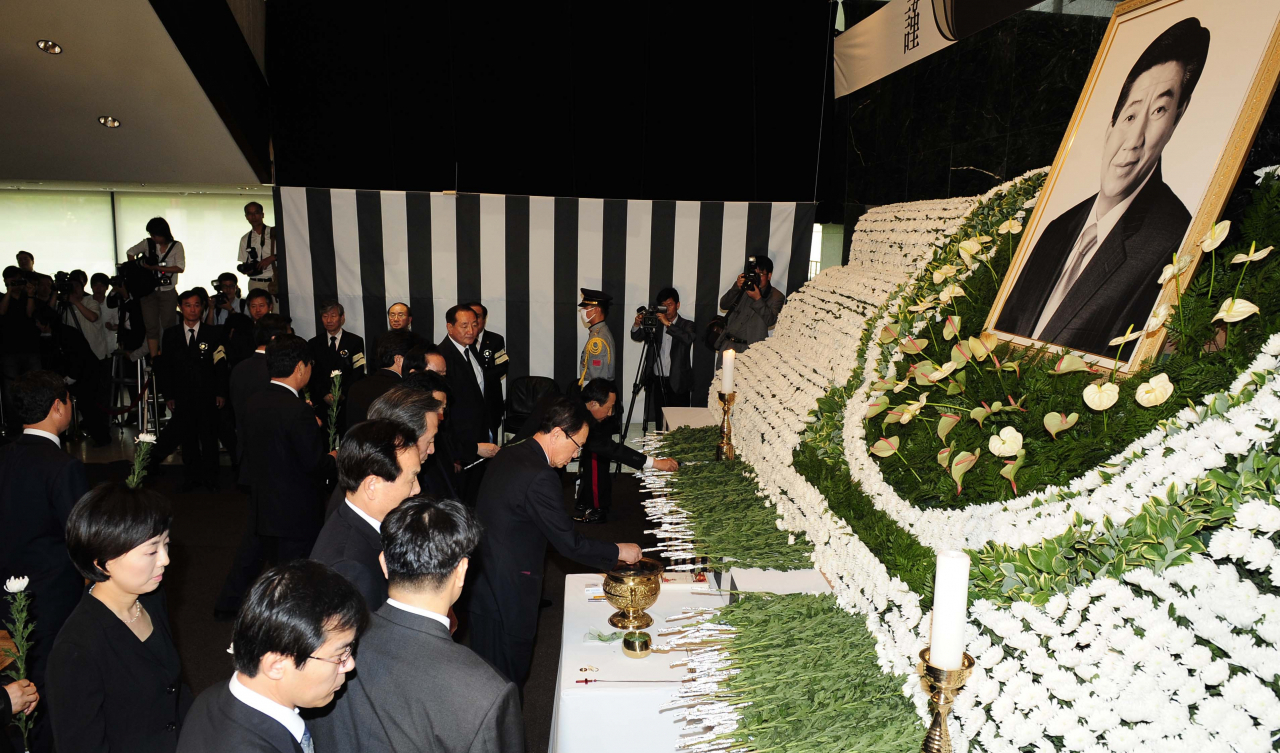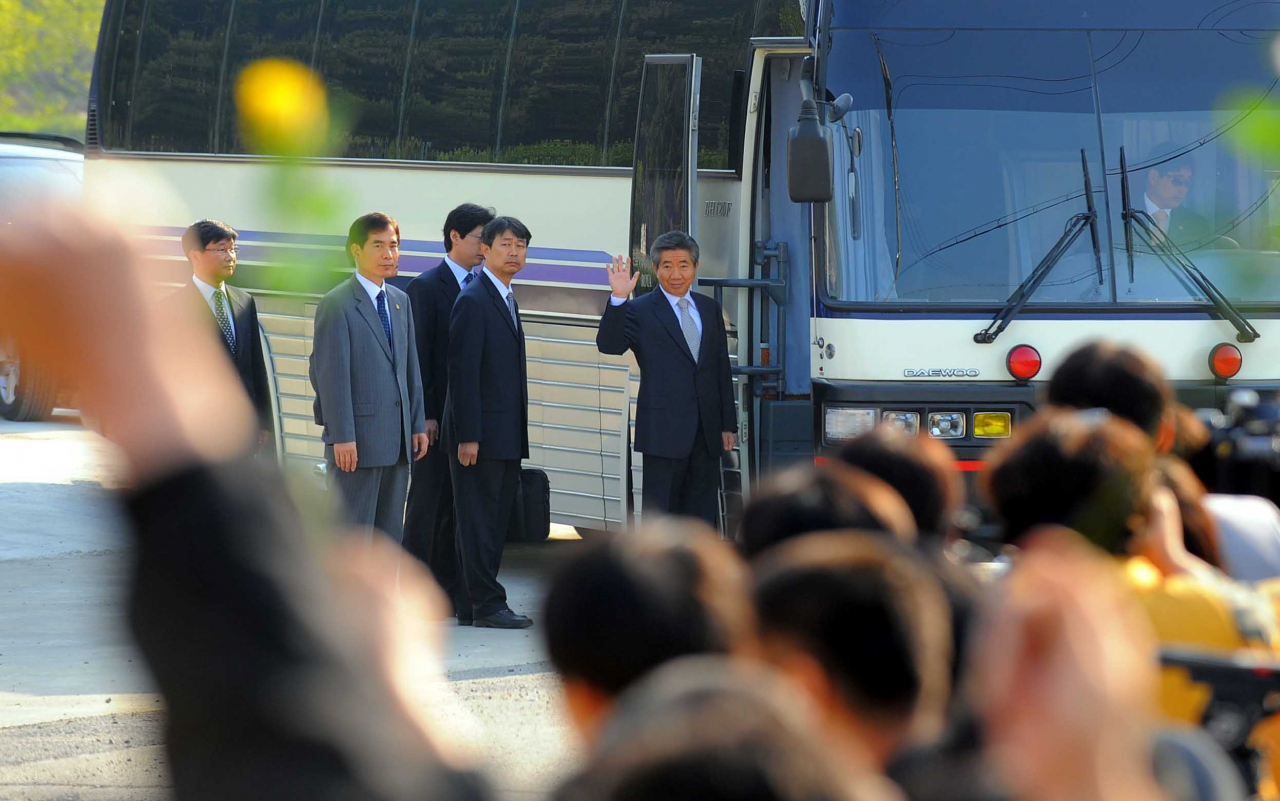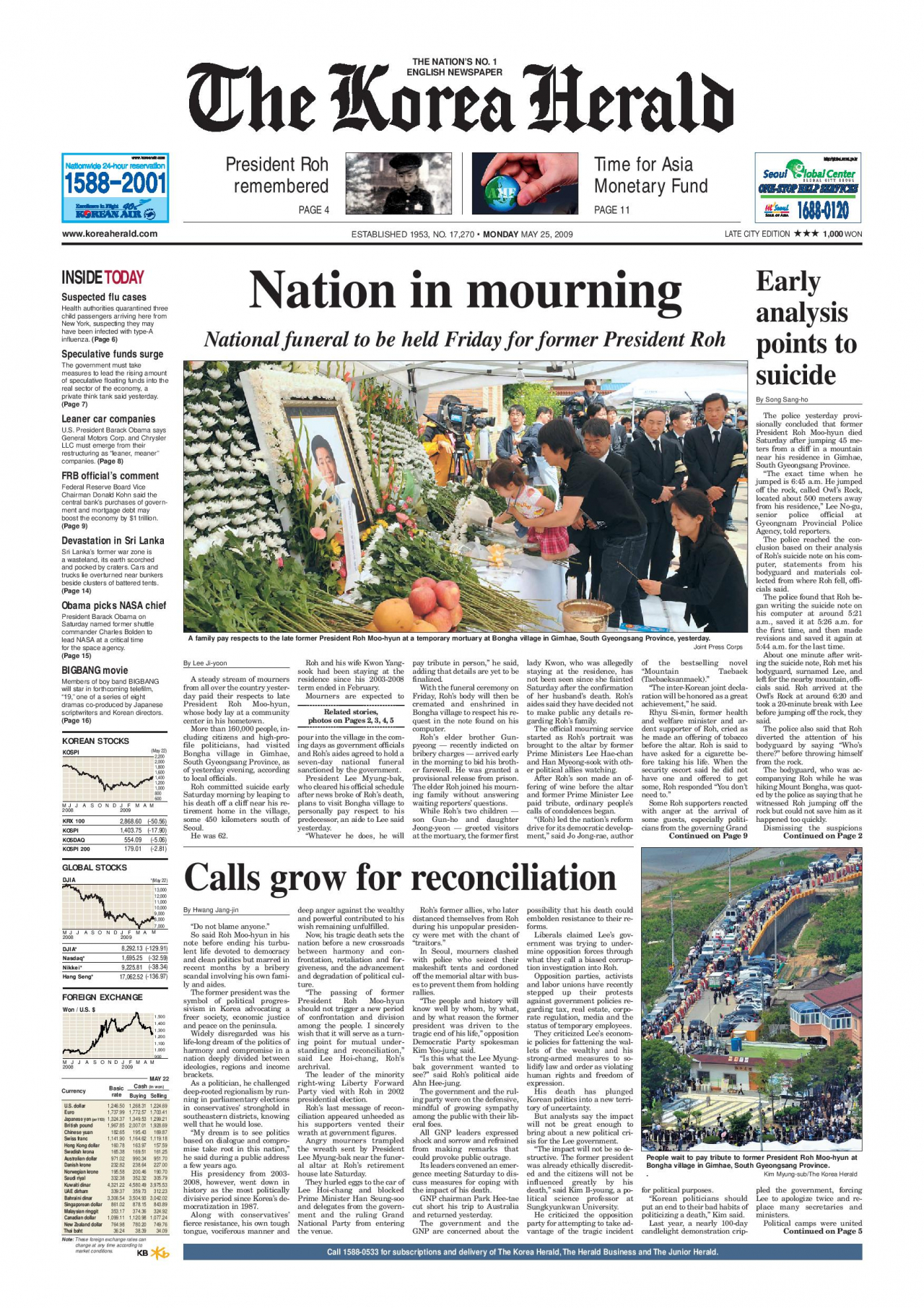[Korea History] In 2009, a suicide forces Korea's political pendulum to left
In both life and death, former President Roh Moo-hyun stood as one of the most polarizing and influential politicians that Korean politics had ever witnessed
By Yoon Min-sik
Published : Nov. 29, 2023 - 16:42

On the morning of May 23, 2009, the South Korean public received shocking news that altered the country’s political course for years to come: Former President Roh Moo-hyun died after throwing himself off a cliff near his retirement home in Bongha Village in Gimhae, South Gyeongsang Province.
The deceased leader, then 62 years of age, had been under investigation concerning corruption allegations of his family members and those around him.
While there was no conclusive evidence suggesting that Roh himself was involved in any wrongdoings -- and many suspected the probe’s possible political motivation -- the rigorous scrutiny by prosecutors and the media had taken its toll on the reputation of Roh, whose No. 1 political asset was his self-made, down-to-earth and iconoclastic image.
The initial shock of Roh’s death just 15 months after leaving the highest office soon transformed into a groundswell of public anger toward the incumbent President Lee Myung-bak and his conservative Grand National Party, the forerunner of the current ruling People Power Party, for going after the rival faction’s icon in retirement.
It led to a surge in support for the liberal Democratic Party of Korea. The left-wing party won the first nationwide election that occurred after Roh’s death -- the local elections in 2010. Roh’s chief of staff and close friend, Moon Jae-in, later went on to win the presidency in 2017.
As an outspoken political outcast, Roh had always been a magnet of controversy and his impact on the South Korean political scene in life would be rivaled only by the impact he left in his wake with his sudden and unexpected death.
Tainted reputation
Dialing back the clock to the start of Roh’s final month alive, the top story for The Korea Herald’s May 1, 2009, edition featured his public apology for the corruption scandal surrounding his family.

The apology was issued a day prior, when he appeared before the prosecution for questioning. That day marked the symbolic fall of Roh, a former human rights lawyer who campaigned against military dictatorship. He became the third former president in the country’s history to be summoned by the prosecution, following in the footsteps of military junta leader Chun Doo-hwan and his partner-in-crime turned successor Roh Tae-woo.
At the center of the probe was the $1 million Roh’s wife, Kwon Yang-suk, received from a businessman named Park Yeon-cha during Roh’s presidency. Roh claimed that he had no knowledge of such a transaction, and Moon said Roh was “extremely furious” after learning about it later.
The prosecution alleged that Kwon used this money to financially support their son and daughter who were living in America at the time, and that she received an additional $400,000 in a separate transaction later on.
Another allegation was the $5 million transaction between Park and Yeon Cheol-ho, Roh’s nephew-by-marriage, which again Roh denied knowledge of.
Just hours after Roh’s death, the prosecution announced that they were closing the investigation into Roh, invoking the regulation applicable in cases of a suspect’s death during an ongoing inquiry. Probes into Roh’s family also came to a halt. Despite Kwon claiming that she alone received the money from Park, the prosecutors considered the couple as persons of interest and thus Roh as a suspect.
Whatever the truth may be, including the nature of the money, it was buried with the late leader.
Of the Roh family, only the daughter, Roh Jung-yeon, faced legal punishment. She was given a suspended jail term for violations of a foreign exchange law that occurred in the process of her receiving funds for a property purchase in the US.

Park, the businessman at the center of the scandal, received a jail term of two years and six months and a fine of 19 billion won ($14.6 million) for other bribery charges. He died in 2020.
To this day, South Koreans are split on whether or not Roh is guilty of bribery, and the answer usually depends on their political stance.
Enduring popularity
As a politician, Roh faced more election losses than victories. In his hometown of Busan, a conservative stronghold, he contested four elections, losing each time. In 2002's presidential election, one of the rare instances where he emerged victorious, he began the race as an underdog, with early polls putting him at a mere 2 percent.
As president, he grappled with bungled reform drives, dismal job approval ratings in the first year, and the high-tension political drama of becoming the first president to face impeachment and surviving it.
Yet, today, Roh stands in memory as one of the most beloved presidents in South Korea.
In several surveys measuring public sentiment about favorite presidents, he often competes with Park Chung-hee for the top spot.
Some studies indicate that regardless of the scandal, the public holds Roh’s morality in high regard. A 2012 study by scholars from Sungkyunkwan University’s media and communications department had 1,083 adults score all the presidents in categories of morality, economic policies, communication, overall state affairs and international affairs. Roh scored the highest overall in morality with 5.14.

When Roh died in 2009, an estimated 5 million people visited altars set up across the country to pay their respects, with 1 million visiting the one in Bongha Village despite it being a remote rural town.
In a June 3 Realmeter poll on approval ratings for political parties, the then-main opposition Democratic Party of Korea overtook the ruling party 27.9 percent to 24 percent. It marked the first time the Democratic Party led the ratings since the pollster started conducting weekly polls in 2005.
The pro-Roh faction within the Democratic Party rose considerably, and the liberal faction enjoyed success in the 2010 local elections.
Many scholars consider Roh among the most important figures in South Korean politics, whose influence has been magnified by his death.
Kim Hyung-A, an associate professor of Korea Politics and History at Australian National University and the last person to interview Roh, said Park Chung-hee and Roh Moo-hyun represent Korea’s opposing political ideologies. Understanding them is crucial to understanding the country’s modern history.
Kim Ho-ki, a professor of sociology at Yonsei University, wrote in a column that Roh was the symbol of the country’s democratization. “After Korea’s liberation, the two zeitgeists of our society were industrialization and democratization. If Park Chung-hee was the symbol of the former, Roh was of the latter.”
Cheon Jung-hwan, a professor of Korean literature at Sungkyunkwan University, wrote in a column that immortalization of Roh’s death deepened the factional divide and confrontation within Korean politics. There are also those who believe that the liberal faction used Roh’s idolization to gain power.
Whatever the assessment on Roh and his death may be, the former president’s legacy and his abrupt death in 2009 shaped South Korean politics in a way few people have ever done.



















![[Today’s K-pop] Treasure to publish magazine for debut anniversary](http://res.heraldm.com/phpwas/restmb_idxmake.php?idx=642&simg=/content/image/2024/07/26/20240726050551_0.jpg&u=)